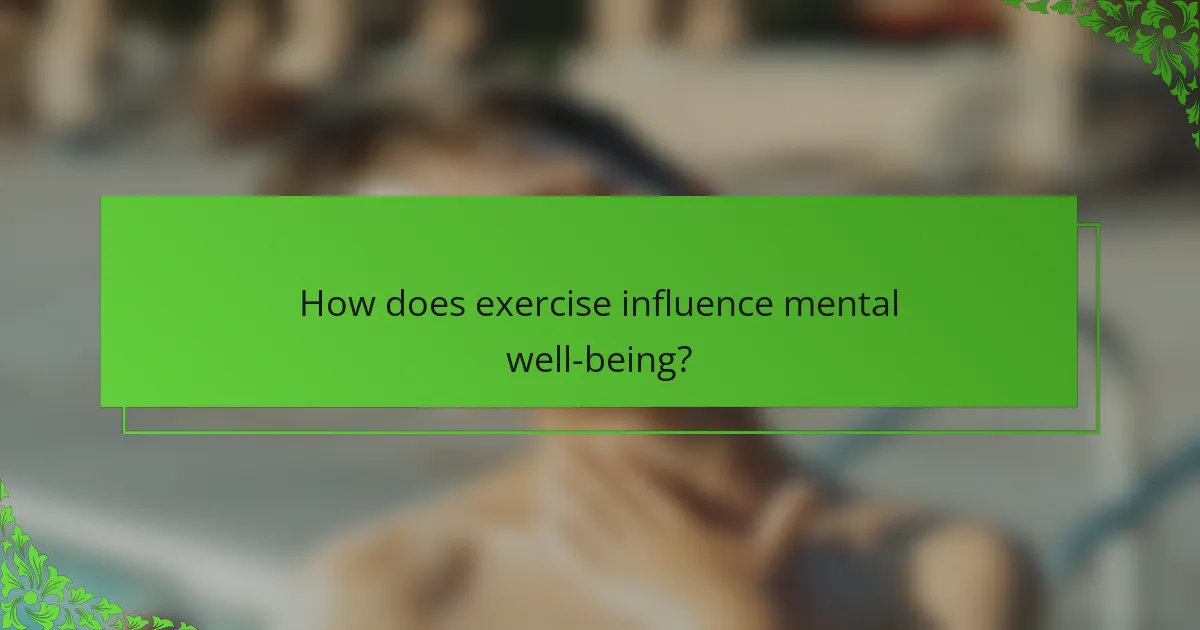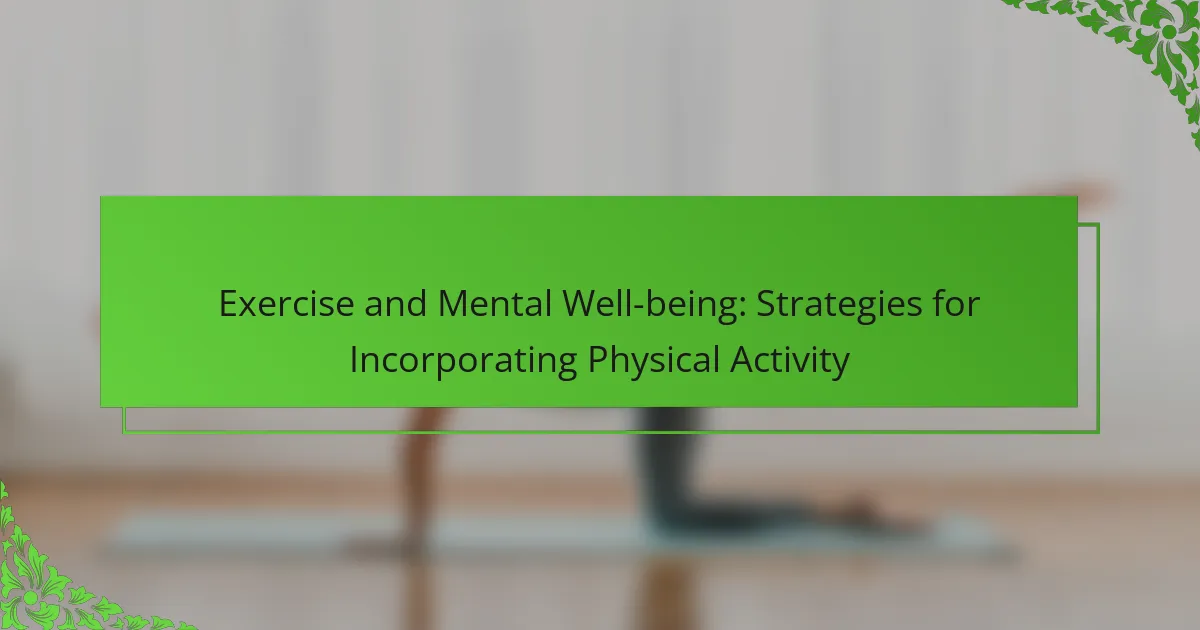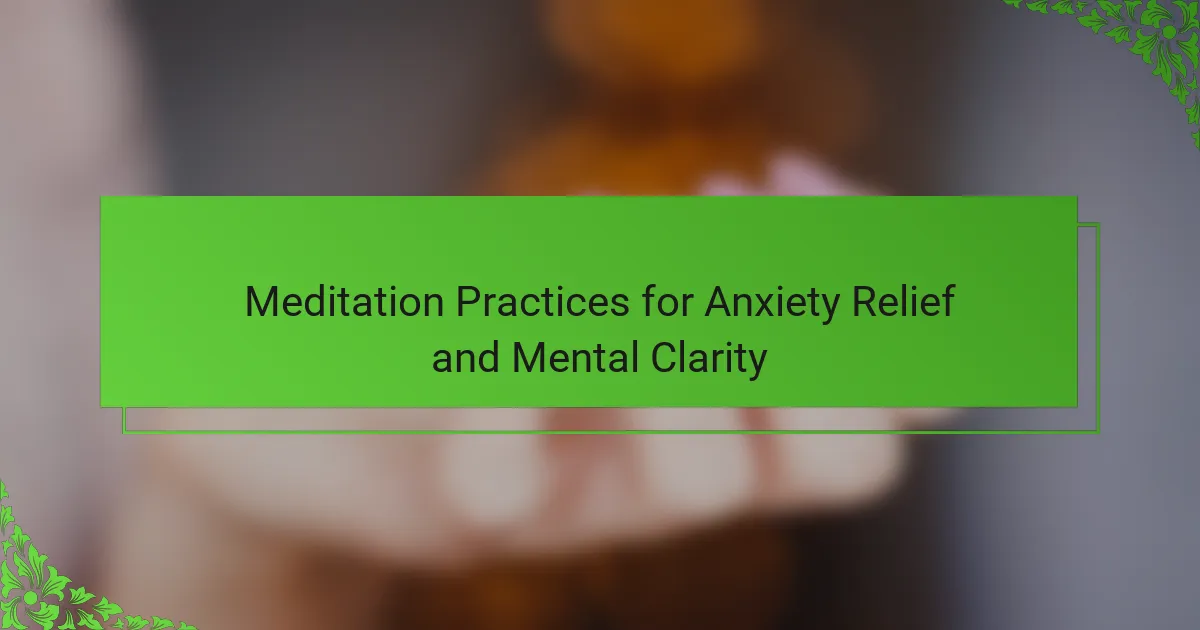Exercise plays a crucial role in enhancing mental well-being by reducing stress and improving mood. This article explores effective strategies for incorporating aerobic exercise, strength training, and yoga into your routine. It also highlights practical tips for making physical activity a consistent part of daily life, while addressing common pitfalls to avoid. Engaging in personalized and enjoyable workouts can significantly boost your mental health benefits.

How does exercise influence mental well-being?
Exercise significantly enhances mental well-being by reducing stress, improving mood, and boosting cognitive function. Regular physical activity releases endorphins, which are natural mood lifters. It also promotes better sleep, which is crucial for mental health. Studies show that even moderate exercise can alleviate symptoms of anxiety and depression. Incorporating a mix of aerobic and strength training can provide comprehensive mental health benefits.
What are the psychological benefits of physical activity?
Physical activity significantly enhances mental well-being by reducing symptoms of anxiety and depression. Regular exercise promotes the release of endorphins, which improve mood and create a sense of happiness. Studies show that engaging in physical activity can lead to better stress management and increased resilience. Additionally, exercise fosters social interaction, which is crucial for emotional support and mental health.
How does regular exercise affect stress levels?
Regular exercise significantly reduces stress levels by promoting the release of endorphins and improving mood. Physical activity enhances resilience against stress by increasing overall mental well-being. Engaging in regular workouts can lower cortisol levels, the hormone associated with stress, leading to a more balanced emotional state. Studies show that even moderate exercise, such as walking for 30 minutes, can yield substantial stress-relief benefits.
Why is exercise important for anxiety management?
Exercise is crucial for managing anxiety as it reduces stress and boosts mood. Physical activity increases endorphin levels, enhancing overall mental well-being. Regular exercise can also improve sleep patterns, which is vital for anxiety reduction. Studies show that even moderate exercise, like walking, can significantly lower anxiety levels and improve emotional resilience.

Which types of exercise are most beneficial for mental health?
Aerobic exercise, strength training, and yoga are most beneficial for mental health. These activities enhance mood, reduce anxiety, and improve cognitive function.
Aerobic exercise, such as running or cycling, boosts endorphin levels, leading to increased happiness. Strength training has been linked to reduced symptoms of depression. Yoga promotes mindfulness, helping to alleviate stress and anxiety.
Incorporating these exercises into a regular routine can significantly enhance mental well-being. Aim for at least 150 minutes of moderate-intensity aerobic activity weekly, along with two days of strength training.
How do aerobic exercises impact mood and cognition?
Aerobic exercises significantly enhance mood and cognitive function. Engaging in activities like running or cycling releases endorphins, reducing stress and anxiety. Studies show that regular aerobic activity improves attention, memory, and overall mental clarity. This positive impact is attributed to increased blood flow to the brain and the promotion of neurogenesis, which can lead to better emotional regulation and cognitive resilience.
What role do strength training and resistance exercises play in mental health?
Strength training and resistance exercises significantly enhance mental health by reducing anxiety and depression. These forms of exercise release endorphins, improving mood and overall well-being. Research indicates that consistent strength training can lead to lasting improvements in self-esteem and cognitive function. Additionally, engaging in these activities fosters social interaction and a sense of community, further contributing to mental resilience.
How does yoga contribute to psychological well-being?
Yoga significantly enhances psychological well-being by reducing stress and promoting mindfulness. Regular practice fosters emotional resilience, improves mood, and boosts self-esteem. Research indicates that yoga can lower anxiety levels and enhance overall mental health. Incorporating yoga into daily routines can lead to long-term psychological benefits, making it a valuable strategy for mental well-being.

What strategies can help incorporate physical activity into daily routines?
Incorporating physical activity into daily routines can be achieved through various practical strategies. Start by setting specific, achievable goals to motivate consistent exercise. Integrate short workouts into your schedule, such as brief sessions during breaks or after meals. Utilize active transportation, like walking or cycling, instead of driving. Engage in enjoyable activities, such as dancing or group sports, to maintain enthusiasm. Lastly, establish a routine that includes regular physical activity, making it a non-negotiable part of your day.
How can setting realistic fitness goals improve adherence?
Setting realistic fitness goals enhances adherence by fostering motivation and creating achievable milestones. This approach builds confidence and reduces frustration. Research shows that individuals who set specific, measurable goals are more likely to maintain their exercise routines. By focusing on attainable objectives, people are less likely to experience burnout, promoting long-term commitment to physical activity. Additionally, celebrating small successes reinforces positive behavior, further encouraging consistent participation in exercise.
What are effective methods for overcoming barriers to exercise?
Effective methods for overcoming barriers to exercise include setting realistic goals, creating a schedule, finding enjoyable activities, and seeking social support. Establishing small, achievable targets fosters motivation. A consistent routine helps integrate exercise into daily life. Enjoyable activities increase adherence, while social support enhances accountability.
How can social support enhance motivation for physical activity?
Social support significantly enhances motivation for physical activity by providing encouragement, accountability, and shared experiences. Engaging with friends or family can foster a sense of belonging, making exercise more enjoyable. Studies show that individuals with social support are more likely to adhere to their fitness routines. For instance, exercising in groups can lead to increased commitment and improved mental well-being. Additionally, positive reinforcement from peers can boost self-esteem and motivation, further promoting an active lifestyle.

Which unique approaches can enhance the mental health benefits of exercise?
Incorporating unique approaches can significantly enhance the mental health benefits of exercise. Mindfulness practices during workouts, such as focusing on breathing, improve mental clarity and reduce stress. Group activities foster social connections, combating loneliness and boosting mood. Personalized routines tailored to individual preferences increase adherence and enjoyment, enhancing overall psychological benefits. Engaging in nature-based activities, like hiking, promotes relaxation and reduces anxiety levels.
How does engaging in outdoor activities affect mood?
Engaging in outdoor activities significantly improves mood by reducing stress and enhancing overall well-being. Exposure to nature, sunlight, and physical exertion releases endorphins, which elevate mood and promote feelings of happiness. Studies show that regular outdoor exercise can decrease anxiety levels and improve mental clarity. Additionally, social interaction during group activities fosters a sense of community, further boosting emotional health.
What are the benefits of group exercise versus solo workouts?
Group exercise promotes social interaction and accountability, enhancing motivation compared to solo workouts. Participants often experience increased enjoyment and adherence to fitness routines. Group settings can lead to improved mental well-being through shared experiences and support. Studies show that social engagement during exercise can reduce stress and anxiety levels significantly.
How does mindfulness during exercise improve mental clarity?
Mindfulness during exercise enhances mental clarity by promoting focus and reducing distractions. This practice encourages individuals to connect with their bodies and breath, fostering a state of awareness. Studies show that mindful exercise can lead to improved cognitive function and emotional regulation. Engaging in activities like yoga or tai chi integrates mindfulness, resulting in better stress management and heightened mental acuity.

What are the common pitfalls in using exercise for mental well-being?
Common pitfalls in using exercise for mental well-being include inconsistency, setting unrealistic goals, and neglecting enjoyment. Inconsistent exercise routines lead to minimal benefits. Unrealistic goals can cause frustration and discourage continued participation. Neglecting enjoyment may result in burnout, making it difficult to maintain a regular exercise habit. Recognizing these pitfalls helps individuals create sustainable, enjoyable exercise plans that enhance mental well-being.
How can overtraining negatively impact mental health?
Overtraining can significantly harm mental health by increasing anxiety, depression, and mood swings. Excessive physical activity leads to fatigue and burnout, diminishing motivation. Chronic stress from overtraining may disrupt sleep patterns, further impacting emotional well-being. Research shows that athletes experiencing overtraining often report decreased self-esteem and increased irritability. Balancing exercise with adequate rest and recovery is essential for maintaining positive mental health.
What mistakes do people often make when starting an exercise regimen?
Many people mistakenly set unrealistic goals when starting an exercise regimen. They often underestimate the time commitment required, leading to frustration. Additionally, neglecting proper warm-up and cool-down routines can result in injuries. Another common error is failing to incorporate rest days, which are crucial for recovery and progress. Lastly, individuals may overlook the importance of enjoying the activity, which can hinder long-term adherence.
How can unrealistic expectations hinder progress?
Unrealistic expectations can significantly hinder progress in exercise and mental well-being. They create feelings of frustration and inadequacy, leading to decreased motivation. When individuals set unattainable goals, they may abandon their routines altogether. This cycle can negatively impact mental health, reinforcing a belief that success is out of reach. Setting realistic, incremental goals fosters a positive mindset and encourages consistent progress.
What expert tips can optimize the mental health benefits of exercise?
Regular physical activity significantly enhances mental health. To optimize these benefits, consider the following expert tips:
1. Set realistic goals to maintain motivation and track progress.
2. Incorporate a variety of exercises, such as aerobic, strength training, and flexibility workouts, to target different aspects of well-being.
3. Schedule workouts at consistent times to establish a routine, making exercise a regular part of daily life.
4. Engage in group activities or classes to foster social connections and support.
5. Practice mindfulness during exercise to enhance focus and reduce stress.
6. Listen to your body and rest as needed to prevent burnout and injuries.
These strategies can maximize the mental health benefits associated with exercise.



